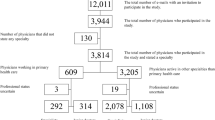Abstract.
Objectives: Problem-oriented drug information is characterised by health professionals actively seeking drug information through various sources. In this study our objective was to determine the quality and impact of problem-oriented drug information among physicians. Methods: Evaluation forms accompanying 163 written answers to physicians from a drug information centre were used to examine the quality and impact of problem-oriented drug information during the period December 1996 to June 1998. Physicians were asked whether the preliminary telephone answer was useful and, furthermore, whether the written answer was fast enough, relevant, adequately comprehensive and had valuable references. Physicians were also asked whether the answer had caused any change in their clinical practice. If yes, they were then asked to describe the actual changes. Results: Of 163 evaluation forms, 117 (72%) were returned by physicians. Eighty-six physicians received a preliminary telephone answer and 83 (97%) stated that this was useful. Among the physicians, 92 (79%) found that the answer was fast enough, relevant, adequately comprehensive and with valuable references, while 19 (16%) found that the answer satisfied three of these four quality criteria. Seventy-one evaluation forms stated that the answer had caused a change in clinical practice. Sixty-eight (96%) of these contained a description of the change. Thirty-five evaluation forms that stated that the answers did not cause any change in clinical practice showed the same quality score as for the total group. Thus, 28 (80%) of these satisfied four and 5 (14%) satisfied three of the quality criteria. Improved routines for and control of ongoing pharmacotherapy was the most common change in clinical practice reported by physicians. Conclusion: The results show that, in general, physicians found problem-oriented drug information to be of high quality, and that it had an impact on their clinical practice. Problem-oriented drug information could be a method to change clinical practice among physicians.
Similar content being viewed by others
Author information
Authors and Affiliations
Additional information
Accepted in revised form: 6 September 2001
Electronic Publication
Rights and permissions
About this article
Cite this article
Schjøtt, J., Pomp, E. & Gedde-Dahl, A. Quality and impact of problem-oriented drug information: a method to change clinical practice among physicians?. Eur J Clin Pharmacol 57, 897–902 (2002). https://doi.org/10.1007/s00228-001-0386-5
Received:
Published:
Issue Date:
DOI: https://doi.org/10.1007/s00228-001-0386-5



